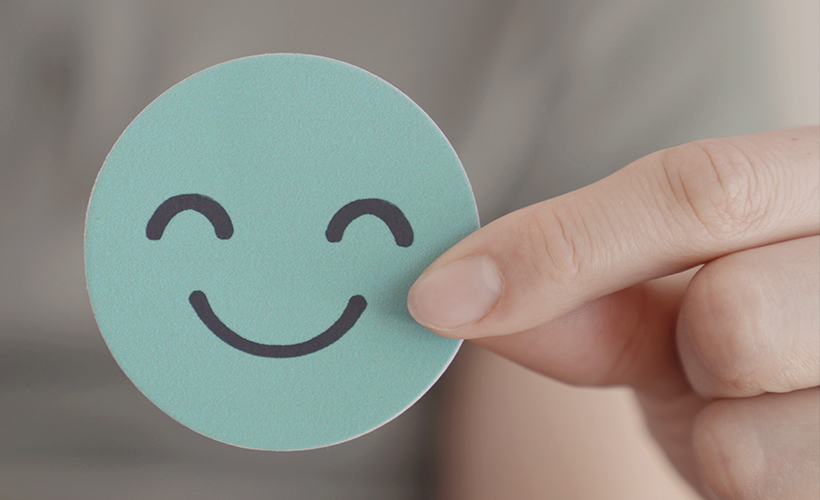While there’s a great deal of talk about the importance of maintaining one’s physical health, mental health tends to get overlooked or even downplayed. Yet, the two are heavily interlinked. Poor physical health can lead to poor mental health, and vice versa; for example, depression can increase the risk of physical health problems, including diabetes and heart disease. As such, for librarians and educators, encouraging students and patrons to maintain physically healthy lifestyles is important, but it won’t really have an impact unless mental health and wellness is also taken into consideration.
How common is mental illness? More common than you think: one study published in The Lancet Psychiatry concluded that approximately half the global population will develop one or more mental illnesses by the time they reach age 75. According to the CDC, more than one in five American adults currently live with a mental illness, and one in 25 Americans struggles with a serious mental illness, such as schizophrenia or major depression. With numbers like that, it’s likely that some of your students and patrons are affected by mental illness or are close to someone who is.
If you’re looking for videos on mental health to share with your patrons, we at Infobase encourage you to explore the videos on the topic that you can find on our On Demand platforms. These platforms include:
- Films On Demand for colleges and universities
- Classroom Video On Demand for secondary schools
- Access Video On Demand for public libraries.
Below, we highlight 16 videos and series available through these products that you can use to spread awareness about mental illness. (The titles appear on all three platforms unless otherwise noted. Some of these titles contain mature themes or content; viewer discretion is advised. If you or someone you know is struggling with mental health issues, dial 988 for the Suicide and Crisis Lifeline or visit their website.)
Bellevue: Inside Out (HBO®)
New York City’s Bellevue Hospital has a renowned psychiatric emergency center that treats 7,000 men and women annually. This gritty program takes a daunting look at the daily operation of the center by focusing on a handful of people as they struggle with their illnesses. The entire experience is presented, from arrests of the criminally insane and admissions of new patients to long-term treatment and therapy groups. In addition to working with mental disorders, doctors and nurses also confront drug and alcohol addiction in an environment where 50 percent of their patients have substance abuse problems. (Available in the U.S. & Canada.)
Want to learn more about Bellevue: Inside Out? We interviewed the film’s producers, Maryann DeLeo and Sarah Teale, about this remarkable documentary, which helped shape important policy changes in the treatment of mental health patients. Click on the link below to watch the interview!
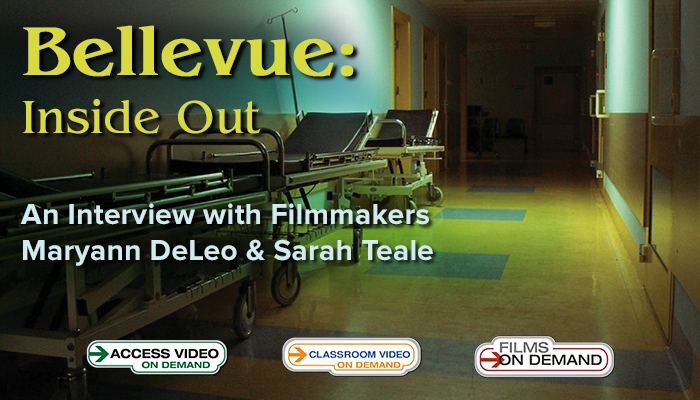
WATCH VIDEO: Take a Dive into the World of Mental Illness—Bellevue: Inside and Out
The Weight of Gold (HBO)
From HBO Sports comes a poignant, much-needed documentary look at the widespread mental health issues among Olympic athletes, exposing the lack of resources in place to help them sustain life beyond their sports. Directed and executive produced by filmmaker Brett Rapkin—and narrated by the most decorated Olympian of all time, Michael Phelps—The Weight of Gold features profound interviews with top Olympic athletes who open up about the crippling depression rampant among competitors—particularly after the Games are over. The Olympians, including Phelps, who speaks extensively about his personal battles with mental health, explain how debilitating the extreme pressures of competition, feelings of inadequacy, and financial burdens can be—and ultimately mourn the tragic fate that these circumstances have brought to peers who have taken their own lives. A timely and honest reflection on mental health in athletics, The Weight of Gold brings to light the life-threatening struggles of Olympic athletes, giving this often overlooked crisis the attention it deserves. (Available in the U.S. & Canada.)
Ken Burns Presents Hiding in Plain Sight: Youth Mental Illness (PBS)
Hiding in Plain Sight: Youth Mental Illness is a two-part, four-hour documentary that explores America’s mental health crisis through the eyes of more than 20 young people, their providers, advocates, family, and friends. The interviewees speak courageously about their challenges, difficulty finding treatment, and encounters with stigma—making their experiences more relatable for all of us.
Mysteries of Mental Illness Series (PBS)
In this four-part series, explore the evolution in understanding, and the dramatic attempts across generations, to unravel the difficult questions surrounding mental illness people have grappled with throughout history: What causes it? And how is it best treated?
Decolonizing Mental Health (PBS)
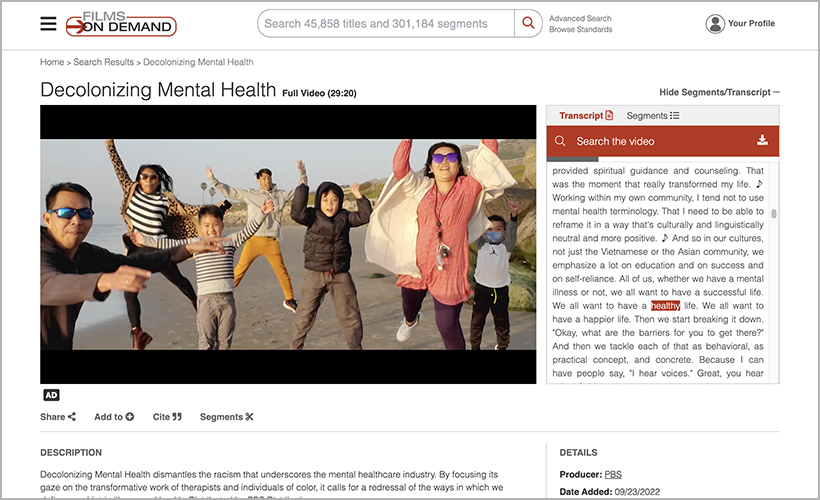
Decolonizing Mental Health dismantles the racism that underscores the mental healthcare industry. By focusing its gaze on the transformative work of therapists and individuals of color, it calls for a redressal of the ways in which we define psychiatric illness and health.
Mental Health: Manager’s Edition and Mental Health: Worker’s Edition Series (Channel 1 Creative Media)
Mental health and well-being is perhaps the most significant health and safety issue in the workplace today. These two series are comprehensive guides to dealing with this very topic. Mental Health: Manager’s Edition focuses on effective tips for managers and supervisors to ensure they are managing the mental health and well-being of their employees and teams, as well as their own well-being. Mental Health: Worker’s Edition features tips for how workers can assist in maintaining a psychologically healthy workplace. Furthermore, it details how to manage their own mental health.
Is Technology Dangerous to Our Mental Health? (Makematic)
With increased screen time for learning, parents and educators are worried that this can have a negative effect on a young person’s mental health. This video in the Teaching Online Masterclass series looks at the latest research about technology and mental health.
I Am Gen Z (Filmhub)
Through expert interviews and the web lens of Gen Z, this documentary explores how the explosion of the digital revolution is impacting our society and mental health. (Available through Films On Demand and Access Video On Demand in the U.S., Canada, U.K., and Australia/New Zealand.)
The Truth About Improving Your Mental Health (BBC Worldwide Learning)
Clinical psychologist Professor Tanya Byron teams up with former England footballer Alex Scott, who has suffered from depression, to discover how the latest science can help us gain greater control over our state of mind and improve our mental health and well-being. Even in normal times, one in four of us will experience mental health difficulties, but living through a global pandemic has put our mental health under unprecedented strain. Over the past year, a team from Imperial College London, in collaboration with the BBC, have surveyed the mental health of over 350,000 people across the U.K. This unique study provides a snapshot before and during the pandemic, revealing its shocking impact.
Food and Mental Health (NewsHour Productions)
The food we eat affects us in many ways. A recent study from Massachusetts General Hospital and Harvard Medical School found a link between the consumption of ultra-processed foods and an increase in the risk of depression. In this NewsHour program, Ali Rogin speaks with Olivia Okereke, an associate professor of psychiatry at Harvard Medical School who worked on the study, to learn more. (Available in the U.S. & Canada.)
Football, Prince William, and Our Mental Health (BBC Worldwide Learning)
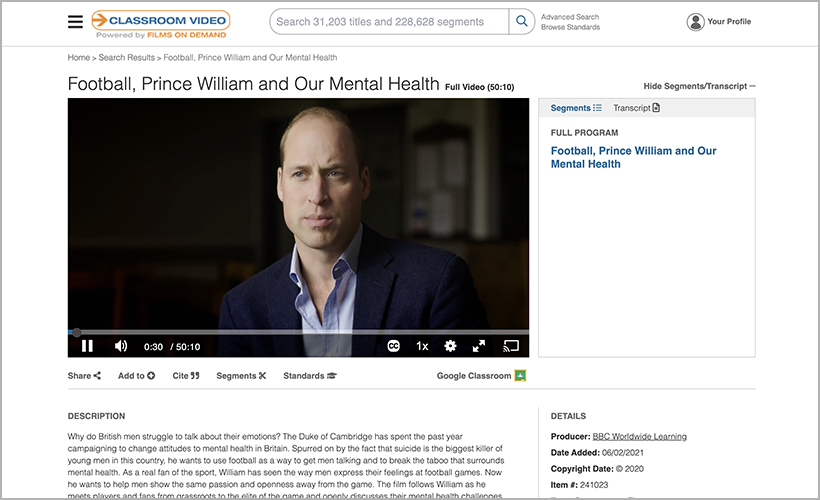
Why do British men struggle to talk about their emotions? The Duke of Cambridge has spent the past year campaigning to change attitudes to mental health in Britain. Spurred on by the fact that suicide is the biggest killer of young men in this country, he wants to use football (soccer) as a way to get men talking and to break the taboo that surrounds mental health. As a real fan of the sport, William has seen the way men express their feelings at football games. Now he wants to help men show the same passion and openness away from the game. The film follows William as he meets players and fans from grassroots to the elite of the game and openly discusses their mental health challenges.
Joe Wicks: Facing My Childhood (BBC Worldwide Learning)
Joe Wicks became a U.K. national hero during COVID lockdown with his hugely successful “PE with Joe” workouts. But in the wake of the pandemic, it’s not just the nation’s physical health that concerns him—it’s our mental health. Many of the thousands of letters and messages Joe has received since he began his workouts have been from parents, confiding in him about their own mental health struggles, and their worries for their children. Unfortunately, Joe knows all too well how stressful and confusing it can be when you are a child and your parents aren’t well, and he wants to find out more. Joe opens up about his mother’s OCD, eating disorders, and anxiety, as well as his father’s heroin addiction and depression. (Available through Films On Demand and Access Video On Demand.)
TEDTalks: Kay M. Tye—What Investigating Neural Pathways Can Reveal About Mental Health (TED)
Neuroscientist Kay M. Tye investigates how your brain gives rise to complex emotional states like depression, anxiety or loneliness. From the cutting edge of science, she shares her latest findings—including the development of a tool that uses light to activate specific neurons and create dramatic behavioral changes in mice. Learn how these discoveries could change the way you think about your mind—and possibly uncover effective treatments for mental disorders. (Available through Films On Demand and Access Video On Demand in the U.S. & Canada.)
Workplace Wellness Series (PowerSplash Project)
Stress is certainly prevalent in the workplace but employees are often afraid or ashamed to ask for help. Personal lives account for 20% of stress and discord. Considering we spend a substantial amount of time at work, a company has an opportunity to offer assistance to these employees who are hurting, misguided, or addicted—basically, good people with a problem. The Workplace Wellness series provides an intimate look at issues handled by human resources. These sensitive topics are presented in ways that are compassionate and pro-recovery.
Connecting the Dots (Filmblanc)
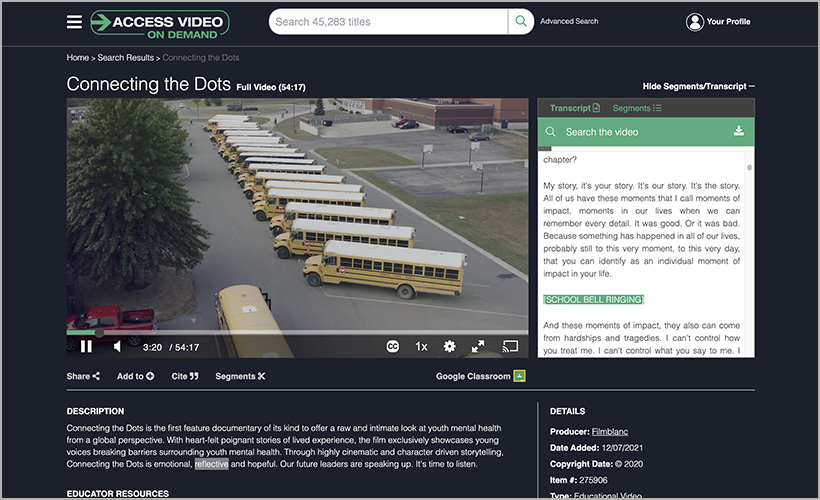
Connecting the Dots is the first feature documentary of its kind to offer a raw and intimate look at youth mental health from a global perspective. With heartfelt poignant stories of lived experience, the film exclusively showcases young voices breaking barriers surrounding youth mental health. Through highly cinematic and character driven storytelling, Connecting the Dots is emotional, reflective, and hopeful. Our future leaders are speaking up. It’s time to listen. (Available through Films On Demand and Access Video On Demand; not available in Canada. A version with Spanish subtitles is also available,)
#Happy: The Dictatorship of Happiness on Social Media (Java Films)
We spend hours on Facebook, Instagram, and Snapchat, seduced by their promise to be able to share our life and our opinions with the whole world. In this virtual world, everyone is happy. Everyone has perfect bodies and lives fulfilled lives in stylish houses surrounded by beautiful friends and family. Everyone shows off and everyone judges. But this irresistible quest for recognition can quickly turn into addiction, wreaking havoc on our mental health. And teenagers are the most susceptible. This program examines the real dangers of the “happycracy” promoted on social networks and hears from some of its young victims. (Available in the U.S., Canada, Asia, U.K., and Australia/New Zealand.)
Subscribers, want to see this content for yourself? Log into Classroom Video On Demand, Access Video On Demand, and Films On Demand today!
Not a subscriber? Take a FREE TRIAL.
See also:
- Content Conversations for Educators: Glow Media Project
- FREE webinar: Seamless Streaming on Demand: The Infobase Approach to Video Collection Development
- Encourage Library Patrons to “Do It Yourself” with These Videos
- Master Information Literacy with Our New Video Series
- FREE white paper: Implementing and Managing Streaming Media Services in Academic Libraries
- Content Conversations for Educators: Andrew Kaplan Discusses Walt Whitman
[Hero image source: SewCreamStudio/Shutterstock.com]
About the Authors

Patrice Keville (she/her) has been Proofreader/Coordinator at Infobase for nearly a decade and has worked in marketing and editorial capacities at library and education-focused companies for well over 15 years. Prior to working at Infobase, she was an Assistant Editor at the H.W. Wilson Company, where she worked on H.W. Wilson’s Core Collections (formerly Standard Catalogs); she was also Online Editor at Genetic Engineering and Biotechnology News. She lives in Brooklyn with her husband, Matthew.

Sharon Golan is Director of Content Licensing at Infobase. With over a decade of experience creating and licensing materials for the education market, she has a keen eye for high-quality, compelling content and enjoys working on films that employ this dynamic art form to educate and enrich audiences.



